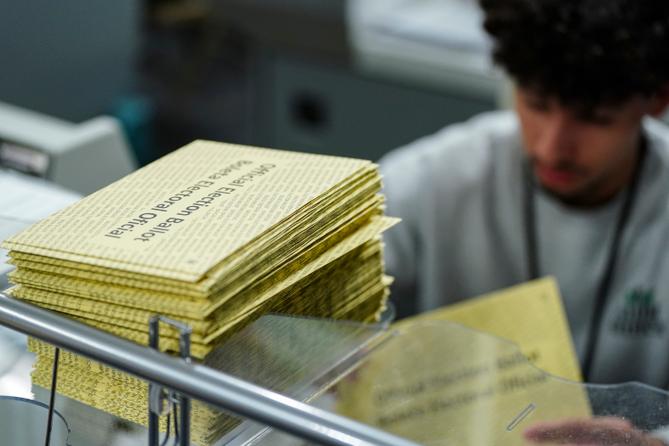This article is made possible through Spotlight PA’s collaboration with Votebeat, a nonpartisan news organization covering local election administration and voting. Sign up for Votebeat's free newsletters here.
Counties that allow mail voters to fix errors that could otherwise get their ballots disqualified rejected fewer ballots during the 2024 general election, a Votebeat and Spotlight PA analysis has found.
Overall, just 0.57% of mail ballots statewide were rejected due to voter errors, such as an improper date, a missing signature on the return envelope, or failure to use the ballot secrecy envelope. That’s less than half the rejection rates of 1.22% in the primary election and 1.31% in the 2022 general election.
However, according to the analysis, the rate was even lower in counties that allow voters to fix, or “cure,” their mail ballots — just 0.49% in those counties were rejected for technical deficiencies on average, compared with 0.59% in counties where curing isn’t allowed. The numbers mean 17% fewer voters had their ballots rejected in the curing counties.
That difference highlights the disparity in the rules Pennsylvania voters face based on where they live, said Jeff Greenburg, a senior adviser on election administration for the Philadelphia-based nonprofit Committee of Seventy. He considers inconsistency the state’s prime election administration problem.
“The number one issue is that we are having a conversation about counties doing things differently,” Greenburg said.
A ruling this past October from the state Supreme Court allows all voters who make such disqualifying mistakes with their mail ballots to cast a provisional ballot on Election Day and have it counted, so long as there are no other errors.
Some counties go beyond that. Thirty-eight counties allow voters to fix errors with their mail ballots in some way — according to information gathered by Votebeat and Spotlight PA ahead of the election — though exactly how varies widely.
Allegheny County, home to Pittsburgh, is one of the counties that send the defective ballot back to the voter with instructions on how to fix the error, as well as a new return envelope. Chester County tells voters to come into the election office with their ID and fix it in person. Delaware County cancels the defective ballot and issues a new one.
Twenty-six counties do not allow any kind of second chance, and the policy in three others is unclear.
The lack of uniformity stems from ambiguity in the law that brought mail voting into the mainstream in Pennsylvania. Act 77, the 2019 law that expanded mail voting beyond absentee ballots — which required a specified reason — requires that voters place their ballot in a secrecy envelope, and place that envelope in a return envelope that voters must sign and date. Failure to do one of these things will prevent the county from counting the ballot.
But the law is silent on what, if anything, counties can do to help voters fix those errors, and court decisions in the years since have established that the choice is up to county election officials.
Greenburg, who served as election director in Mercer County for several years before Act 77 was implemented, said that when absentee ballots were the primary form of mail voting, curing was not an issue for most counties.
“We made efforts to contact voters to give them the opportunity if they forgot to sign or had a missing date,” he said. “I think you will find that most counties were doing something similar in that era.”
Now, as mail voting has grown exponentially with Act 77, counties have gone from having to decide how to deal with a handful of errant ballots to hundreds or potentially thousands of them. And they continue to revise their policies.
The Pennsylvania Department of State has made changes to the return envelope to try to reduce the number of flawed mail ballots counties have to deal with. A Votebeat and Spotlight PA analysis following the 2024 primary found that those changes helped reduce the number of ballots facing rejection, and further changes the department made to the date section of the envelope appear to have helped cut that number even more.
The department’s own analysis, which was verified by Votebeat and Spotlight PA, found that the state’s overall ballot rejection rate for the 2024 General Election — which would include ballots rejected for being returned late or the voter failing to provide ID — was roughly 1%. That’s down from 2.4% in the primary.
Secretary of the Commonwealth Al Schmidt credited the reduction to voter education efforts and the envelope changes, and said the administration is pleased with the improved numbers.
“The Department of State will continue to work with county elections officials to ensure every eligible Pennsylvanian’s legally cast vote can be counted in 2025,” Schmidt said in a statement.
Counties have tended to view the lack of precise language in Act 77 on curing in one of two ways: either as a green light for the practice, or as a barrier.
“None of this is authorized by statute,” Indiana County Solicitor Matthew T. Budash told the county’s commissioners when they voted to adopt a curing policy ahead of the 2024 election. “But it is not prohibited, either.”
Other counties, like Snyder, take the opposite view.
“Our board has consistently taken the stance that the law does not tell us, it doesn't say we ‘shall’ cure ballots," county Commissioner Joe Kantz told Votebeat and Spotlight PA in October.
Other non-cure counties have argued that it gives mail voters the ability to change their initial votes, an option not provided to in-person voters.
“I don’t think that voters should be able to correct” their ballots, Bradford County Commissioner Doug McKlinko said during an October meeting where the county voted to discontinue its curing practice.

